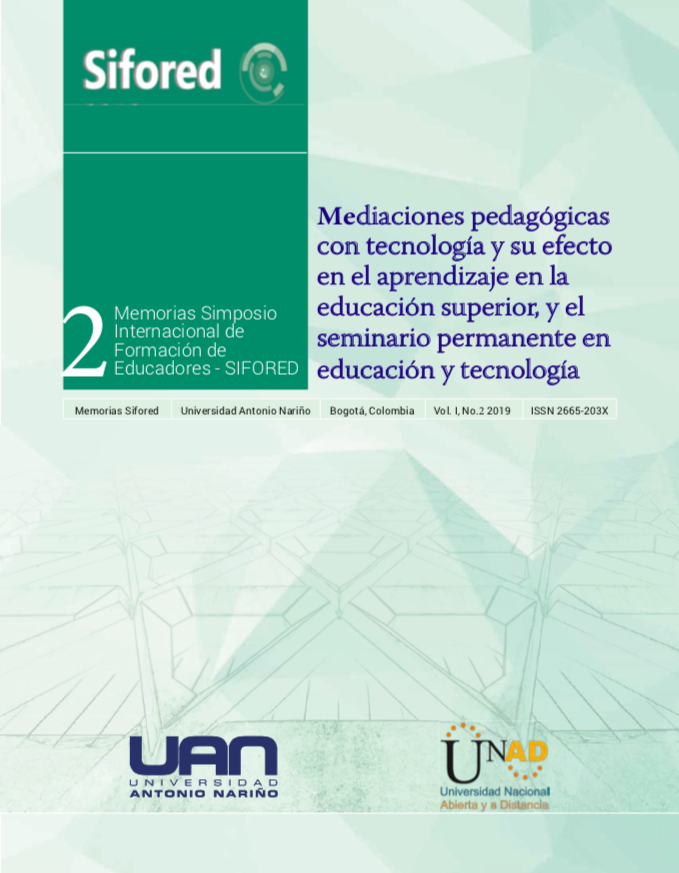VIRTUALIDAD Y PEDAGOGÍA. DISEÑO DE AGENTES PEDAGÓGICOS VIRTUALES EN ESPAÑOL
Mots-clés :
Agentes pedagógicos virtuales, Humanos virtualesRésumé
En este artículo se describe el proceso de diseño previsto para un agente pedagógico virtual de pregunta y respuesta para entrenar a jóvenes en la presentación de entrevistas de trabajo. La posibilidad de generar aplicaciones de bajo costo que permitan el trabajo con comunidades educativas marginales se enfrentan a diversas problemáticas, siendo particular la ausencia de soluciones disponibles en idioma español, así como la poca experiencia o cercanía de docentes al diseño y trabajo con humanos virtuales. Para ello se diseña una solución informática para el rápido desarrollo de personajes de pregunta y respuesta para el idioma español.
Téléchargements
Références
Abdullah A. et al. (2017). Pedagogical Agents to Support Embodied, Discovery-Based Learning. Beskow J., Peters C., Castellano G., O’Sullivan C., Leite I., Kopp S. (eds) Intelligent Virtual Agents. IVA 2017. Lecture Notes in Computer Science, vol 10498. Springer, Cham. DOI: 10.1007/978-3-319-67401-8_1
Barange, M.; Saunier, J. & A. Pauchet (2017). Pedagogical Agents as Team Members: Impact of Proactive and Pedagogical Behavior on the User. Proceedings of the 16th Conference on Autonomous Agents and MultiAgent Systems (AAMAS ‹17). International Foundation for Autonomous Agents and Multiagent Systems, Richland, SC, 791-800.
Göbel, S., Wendel, V., Ritter, C., & Steinmetz, R. (2010). Personalized, adaptive digital educational games using narrative game-based learning objects. 5th International Conf.
on E-learning and Games (Edutainment 2010). pp. 438–445. Changchun, China: Springer.
Mampadi, F., Chen, S. Y., Ghinea, G., & Chen, M.-P. (2011). Design of adaptive hypermedia learning systems: A cognitive style approach. Computers & Education, 56(4), 10031011.
DOI:10.1016/j.compedu.2010.11.018
Monterrat, B., Desmarais, M., Lavoué, E., & George, S. (2015). A Player Model for Adaptive Gamification in Learning Envi- ronments. Artificial Intelligence in Education, pp. 297–306.
Springer.
Monterrat, B., Bouchet, F., Lavoué, E., Luengo, V. (2017). Personnalisation et adaptation dans les environnements d’apprentissage: un regard interdisciplinaire sur les perspectives de
recherché. Vers une adaptation des apprentissages générique et multi-aspects. ORPHEE-RDV 2017 Atelier, Jan 2017, FontRomeu, France. https://orpheerdvperso.wordpress.com/ [hal01523750]
Naik, V., & Kamat, V. (2015). Adaptive and Gamified Learning Environment (AGLE). 2015 IEEE 7th International Conf. on Technology for Education (T4E). pp. 7–14. IEEE.
Téléchargements
Publiée
-
Résumé222
-
PDF (Español)95
Comment citer
Numéro
Rubrique
Licence

Ce travail est disponible sous licence Creative Commons Attribution - Pas d’Utilisation Commerciale - Partage dans les Mêmes Conditions 4.0 International.


 Portal de Ciencia Abierta
Portal de Ciencia Abierta